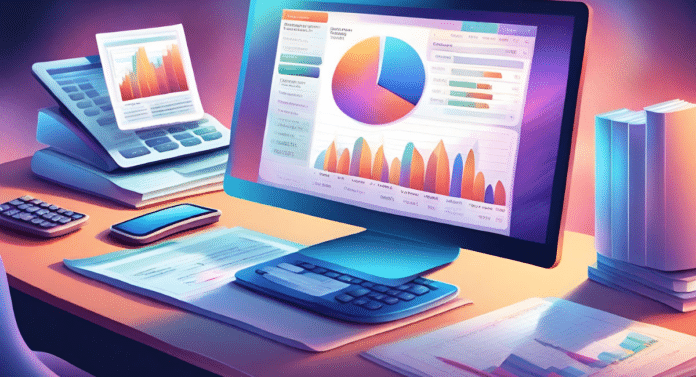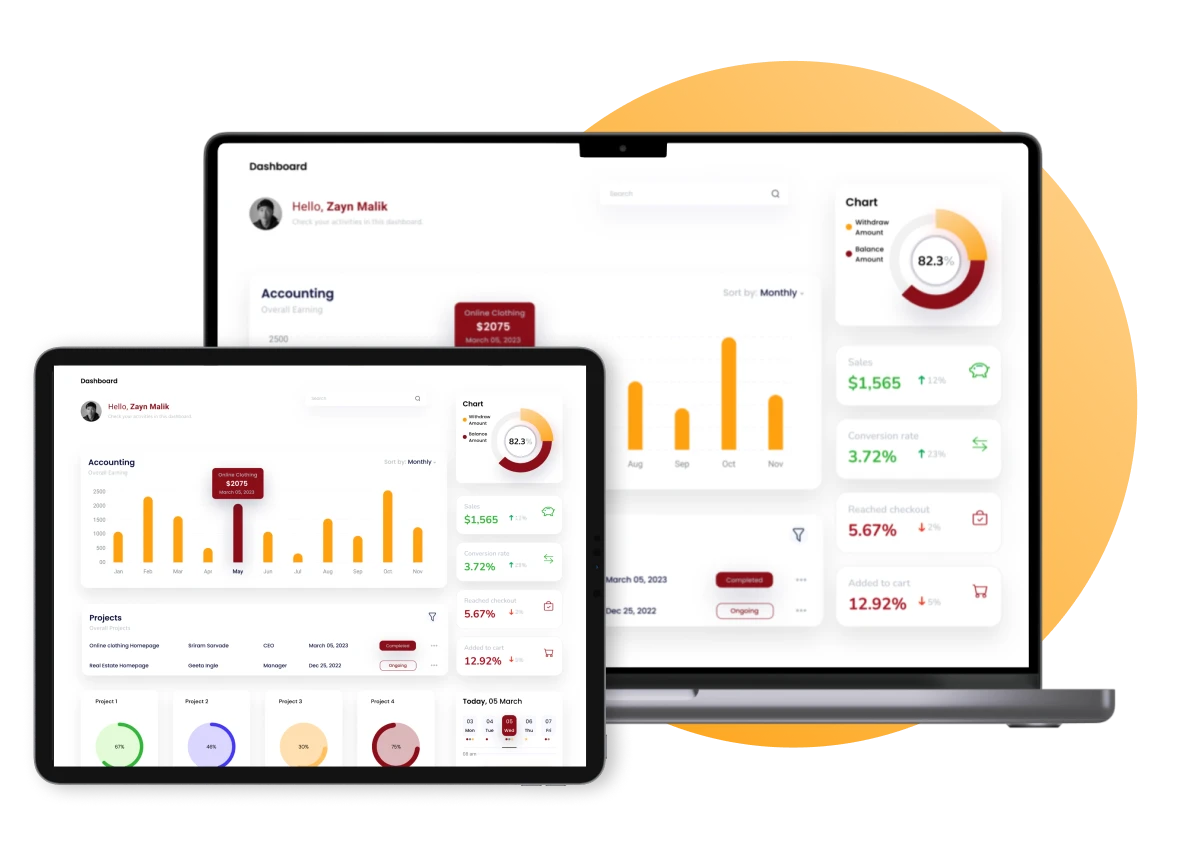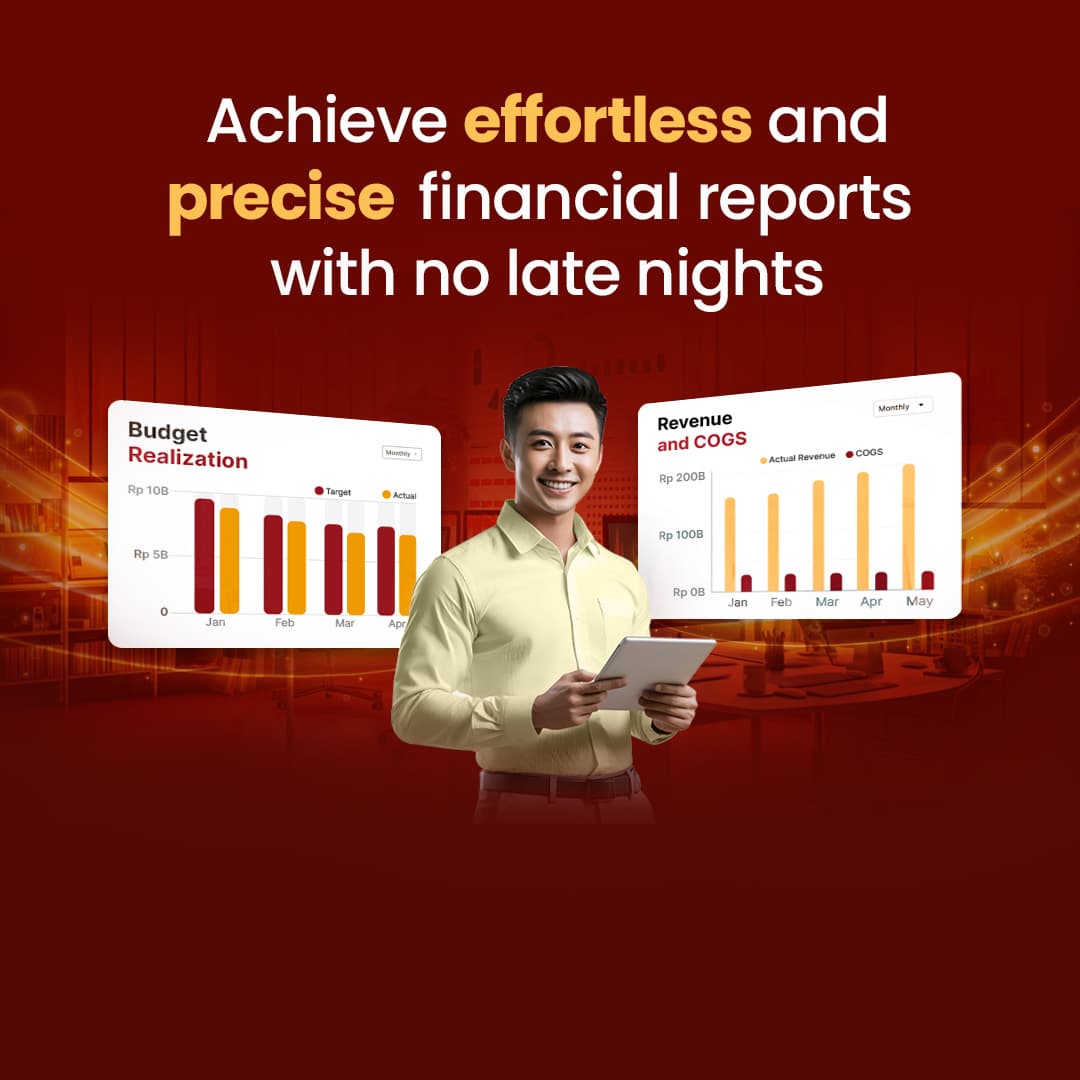An integrated accounting system monitors an organization’s assets, liabilities, revenues, and expenses, updating the general ledger in real time. This enables CFOs, treasurers, and controllers to access accurate financial data instantly, supporting timely, informed decision-making.
Despite benefits like a 90% reduction in manual data entry errors, only half of businesses use accounting software. This underutilization offers a significant opportunity for enhanced financial accuracy and efficiency, critical in industries where precision in financial management is key.
Key Takeaways
|
Table of Content:
Table of Content

What is an Accounting System?
An accounting system is a structured framework used by businesses to manage, record, and analyze financial transactions. It encompasses key processes like tracking income and expenses, managing accounts payable and receivable, payroll, and generating financial reports. These systems ensure financial accuracy, regulatory compliance, and provide valuable insights for informed decision-making—ultimately supporting the work of accountants
With the evolution from manual bookkeeping to automated software, modern accounting systems now allow businesses to streamline operations, reduce errors, and improve efficiency. Transactions that once required tedious, manual input—such as sales, purchases, and journal entries—can now be recorded, modified, and analyzed in real time from a centralized, cloud-based platform accessible anywhere.
The shift toward computerized and cloud-based accounting began in the late 20th century and has since revolutionized financial management. These systems not only enhance accuracy but also enable better forecasting, reporting, and financial planning. As businesses grow and financial activities become more complex, a reliable accounting system becomes essential to maintaining control, minimizing risk, and supporting long-term success.
Types of Accounting Systems
Accounting systems come in three types: manual, computerized, and cloud-based. Each type of accounting software has its characteristics and advantages, suited to different business needs. Understanding the types of accounting software helps businesses choose the best fit for their operations.
1. Manual Accounting Systems
A manual accounting system involves direct, hands-on management of financial records using physical ledgers and paper documents. Transactions are recorded by hand in a general ledger and organized chronologically.
This method is straightforward and does not rely on digital technology, making it accessible and simple to implement. However, it can be labor-intensive and prone to errors, as it requires meticulous attention to detail and manual verification of data. It is most suitable for small businesses with minimal transactions.
2. Computerized Accounting Systems
Computerized accounting systems utilize software to automate the bookkeeping process, enhancing the speed and accuracy of financial management. These systems support a range of functions from recording transactions to generating detailed financial reports.
The software allows for customization to meet specific business requirements and can integrate various accounting tasks like payroll processing and accounts payable management. This type of system is ideal for businesses that need efficient, reliable financial tracking and are looking to minimize human error.
3. Cloud-Based Accounting Systems
Cloud-based accounting systems represent an evolution of computerized accounting, offering all the functionalities of traditional software but on a remote server accessed via the internet. This model provides the flexibility to manage financial records from anywhere, using any device with internet connectivity, which is a significant advantage for businesses with remote or mobile operations.
These systems often come with features that enhance collaboration, such as shared access for multiple users, real-time updates, and integrated communication tools. They are cost-effective and scalable, making them suitable for businesses of all sizes looking to leverage modern technology for financial management.
The Difference Between Single and Double-Entry Accounting
In bookkeeping and accounting, the two foundational methods for recording financial transactions are single-entry and double-entry accounting. Each system offers a distinct approach to tracking the financial activities of a business, influencing the accuracy, complexity, and detailed reporting capability of financial information.
Single-Entry Accounting
Single-entry accounting is a straightforward, simplified bookkeeping approach, often likened to maintaining a checkbook. It involves recording each financial transaction as a single entry in a journal or ledger. Typically, this method only tracks cash disbursements and cash receipts, which may include expenses paid and revenue received.
This system does not track assets, liabilities, or equity accounts, and it does not provide a complete picture of a company’s financial health. Single-entry accounting is best suited for small businesses with a simple structure and minimal transactions.
However, it lacks the robustness needed for comprehensive financial analysis and is more susceptible to errors and fraud because it does not use a systematic verification process.
Double-Entry Accounting
Double-entry accounting is a more comprehensive and systematic approach. It is based on the principle that every financial transaction affects at least two separate accounts, and it must be recorded as such.
For every debit entry in one account, there must be an equivalent credit entry in another account, thereby maintaining the accounting equation: Assets = Liabilities + Equity. This method provides a complete view of the financial transactions affecting a business. It allows for the creation of a balance sheet in addition to the income statement, offering a full picture of the business’s financial health.
Double entry accounting is essential for larger businesses or those that require detailed financial analysis and reporting. The main benefits of this system are its accuracy and the internal checks it provides, which help to prevent errors and fraud.
Which Companies Can Use Cloud Accounting System Software?
Financial data is the company’s most valuable information and must be prevented from falling into the wrong hands. That’s what accounting and economic systems do for their users, controlling accounting from the risk of fraud or error. In addition, companies can provide access to people who have the responsibility of managing finances.
Businesses of all sizes can implement this system. Choose the most appropriate software and by company conditions. Software is a waste when they are too complex or filled with features that are not necessary.
Customizable accounting and ERP software is the best choice. So that in the future, the software can anticipate financial-related challenges and have the potential to emerge in the future.
Understanding the diverse landscape of accounting systems is crucial for businesses seeking the right fit for their financial management needs. From traditional, ledger-based systems to modern, cloud-based software, each type of accounting system offers unique functionalities and benefits.
Traditional systems, revered for their reliability and detailed record-keeping, contrast with the flexibility and accessibility of cloud-based solutions, which allow for real-time financial tracking and scalability.
The choice between these systems depends on various factors including business size, industry-specific requirements, and the level of mobility needed in financial management.
Benefits of Accounting System Software
Business efficiency
In conventional accounting systems, employees have to perform manual processes such as transferring data from one spreadsheet to another. Using the best accounting software can save your company time and prevent mistakes.
The company also has all transaction information in one centralized platform. As a result, you can easily see what has run out or gone into business, and you always know where to find this information.
Simplify tax processing
Dealing with business taxes can be a complex process, as it requires you to keep track of all business transactions. The benefits of accounting software include making this process easier by ensuring that your business’s financial details are in one place.
In addition, this allows you to calculate company revenue semi-automatically instead of manually wasting time and effort working on the required information. An effective accounting system ensures regulatory compliance by keeping up-to-date with financial laws and standards, thereby safeguarding businesses from legal complications.
Accurate estimation and full financial transparency
That’s one of the main advantages of cloud accounting software. Understanding in detail the patterns and trends of your financial performance will take a long time to resolve without a solid system.
Accounting software helps you understand where to cut expenses or where to invest more. With a clear picture of your current financial status, it records and summarizes transactions, and you will find it easier to develop intelligent strategies and allocate resources in the right way.
Advanced security features in accounting systems are also crucial for protecting sensitive financial information against cyber threats and unauthorized access.
Minimizes Errors
When calculations are done manually, there is a greater likelihood of errors since accuracy depends on the accountant’s precision. However, using an accounting system automates the calculation process and can identify errors such as duplicates.
This reduces the amount of time accountants need to spend correcting data and enables them to concentrate on tasks that require their expertise. Sometimes errors get costly, and the damage is far worse than the cost of having accounting software, so companies can treat it like additional insurance, adds one of the marketing managers of a sports website.
Mobile Accessibility
Mobile accessibility in accounting systems enables business leaders to make informed decisions on the go, providing flexibility and enhancing responsiveness to market changes. This feature is increasingly important in today’s fast-paced business environment, where timely decision-making can significantly impact a company’s success.
With mobile accessibility, executives and financial managers are not confined to the office to access critical financial data; they can review, analyze, and make decisions based on real-time financial information from anywhere at any time.
This level of accessibility ensures that businesses can quickly adapt to new financial opportunities or challenges, maintaining a competitive edge in the dynamic marketplace.
Gives High Flexibility
In general, web-based accounting software provides users with the flexibility to monitor their company’s financial information and perform accounting tasks remotely. As long as users have an internet connection, they can access the software through a web browser.
Additionally, the software can be used on mobile devices such as smartphones and tablets, allowing users to view financial statements and carry out necessary tasks at any time and place, subject to permission settings set by administrators.
The scalability of accounting solutions is vital for growing businesses, ensuring that the system can adapt to the increasing complexity and volume of financial transactions.
As businesses expand, their financial operations become more intricate, requiring more robust accounting solutions that can handle this growth without compromising efficiency or accuracy.
Scalable accounting software allows for this expansion, accommodating an increasing number of transactions, more complex financial structures, and a larger user base without necessitating a complete overhaul of the system.
This scalability not only supports the growth trajectory of a business but also ensures a sustainable and adaptable financial management framework that evolves with the business’s needs.
Strategic Decision Making
In the realm of modern business, accounting software transcends beyond mere financial tracking. It plays a pivotal role in strategic decision-making, offering deep insights into financial health, cost management, and profit margins.
This advanced capability enables businesses to make well-informed choices, aligning their strategies with real-time financial data, and thus fostering a more dynamic and responsive business environment.
By leveraging such data-driven strategies, companies can optimize their operations, leading to enhanced operational efficiency and a significant competitive edge.
Customization
Customization in accounting software allows businesses to tailor features and functionalities to their specific operational requirements, enhancing efficiency and relevance. This ability to customize is crucial in meeting the diverse needs of different industries and business sizes.
By allowing companies to modify aspects of the software such as reporting formats, dashboard views, and data analysis tools, accounting software becomes not just a generic solution, but a specialized tool aligned with the unique processes and goals of each business.
This level of customization ensures that businesses are not only able to handle their financial data more effectively but also derive insights that are most relevant to their specific operational contexts, thereby optimizing their overall efficiency and decision-making process.
Advanced Security
Advanced security in accounting systems is crucial for protecting sensitive financial information against cyber threats and unauthorized access. In an era where digital security is paramount, these features play a vital role in maintaining the integrity and confidentiality of financial data.
Robust security protocols, including encryption, multi-factor authentication, and regular security audits, are integral components of modern accounting systems. These measures safeguard against data breaches and cyber-attacks, ensuring that a business’s financial information remains secure from external threats as well as internal vulnerabilities.
This level of security is not just a technical requirement but a critical aspect of building trust and reliability in a company’s financial operations.
Cloud-Based System
In the context of evolving business environments, cloud-based accounting software stands out for its unique benefits. Cloud-based accounting software benefits include accessibility from any location, enhanced data security, and real-time collaboration, making it a cornerstone of modern financial efficiency.
Furthermore, Cloud-based accounting systems provide the advantage of real-time data processing and accessibility from any location, enhancing operational flexibility for businesses.
Also read: How to Find the Best Cloud Accounting?
Features of The Accounting System
A robust accounting system is defined not just by its functionality but also by the range of features it offers to enhance the financial management of a business. These features are designed to bring efficiency, clarity, and control to the financial aspects of an organization, making it easier for businesses to manage their finances effectively.
Let’s delve into some of the key features that make an accounting system an indispensable tool for modern businesses:
- Interactive dashboard: Visibility to your key accounting metrics and data is critical to running a business. Manage and access accounting procedures, streamline processes, and improve data accuracy through interactive dashboards. Monitor your business finances.
- Cash flow monitor: Monitor cash flow conditions accurately and in real-time to avoid business losses. To speed up the decision-making process whenever and wherever you are, easily. Present a report on cash inflows and cash flows out of the company in a certain period.
- Bank reconciliation: Reconciliation is an essential step in ensuring the accuracy of financial data. It is no longer the era of manual bank reconciliation because it takes a long time and is prone to human errors. Automate the business reconciliation process with financial applications.
- General Ledger (GL) and subledger: Modern accounting systems integrate the General Ledger (GL) and Subledger to streamline financial tracking. The GL acts as the central repository for all financial data, while subledgers handle detailed transactions specific to different business areas. This setup allows for automated entry of detailed transactions into the GL, providing real-time visibility and accurate financial reporting across the company.
- Complete financial report: Automated financial reporting, a key feature of advanced accounting systems, streamlines the creation of accurate financial statements, saving time and reducing manual errors.
Generate income statements, cash flow, balance sheets, capital changes, and more in seconds. This system also allows the creation of reports in various types of formats such as tables, graphs, line, and circle charts.
Relevant financial information is presented in a structured and understandable form. These features help accountants organize expenses, budgets, and resources and then create reports for further analysis. - System integration: Modern accounting systems excel in integration with other business operations, syncing data across platforms for a holistic view of company finances.
This integration capability is a significant advantage, as it allows for seamless communication between different business systems — from sales and purchasing to human resources and inventory management.
By syncing data across these platforms, accounting systems provide a comprehensive and real-time overview of a company’s financial health. This interconnected approach not only ensures consistency in data across various business functions but also offers deeper insights for strategic decision-making.
Such an integrated system empowers businesses to operate more efficiently, making informed decisions based on a unified financial picture. - Budget management: Accounting software can integrate with purchasing management to simplify budgeting to track the income and expenses of a business.
Serves as a method of monitoring and exercising control in managing finances and accounting outsourcing services. Accounting software can be integrated with Purchasing Management to simplify purchasing budget management and approval matrix settings.
A process by which future income and expenses are decided to streamline the spending process. - Automatic follow-up: Send automatic notifications to clients to complete payments according to the time your customers are not making payments before the due date. The invoice follow-up process is quite time-consuming.
Send automatic notifications to clients to complete payments by the existing deadline. This can improve the smooth flow of company finances, even if you are busy and don’t have time to manage it directly. - E-invoicing: Businesses must consider finance because it is very important and will affect the development of the business. business owners must take care of several things, so they might pay less attention to the proper finances.
Generate electronic invoices and send them to clients automatically as proof of payment. The business owner can personalize invoices from various components according to their preferences and create them in no time. You can also schedule previous invoices to be sent automatically later.
The Characteristics of a Good Accounting System Application
To ensure that an accounting system truly enhances business operations, it must exhibit certain key characteristics. A good accounting system is much more than a mere tool for crunching numbers; it’s a user-centric platform designed for accessibility, accuracy, and efficiency. Let’s explore these defining characteristics that set apart an accounting system:
- User-friendly: Accounting software targets all users. However, it is still important to ensure that the system of your choice is user-friendly, accessible, and operable by anyone, even those who are not good at accounting or technology.
Furthermore, the program of your choice must be able to adapt or adapt to the needs of the company. If employees have difficulty operating the accounting system, the company is more prone to make mistakes.
User-friendly and easy-to-understand software will allow you to efficiently manage your employees and business. - Easy to access: When running a business, you need to access data quickly and efficiently to make crucial decisions. The handy system allows you to access your critical financial information anytime, from anywhere, because all data and information is encrypted and stored safely on the server.
- Be accurate: Accuracy is the most crucial element of good software. The accounting system must maintain accurate and up-to-date balances in individual accounts and ledgers to be commensurate with the time and investment that has been spent.
Discrepancies may occur due to database crashes or server problems. Still, a sound accounting system must identify and correct errors that could lead to data inaccuracies.
Accounting Systems to Consider
Here are some accounting systems you can consider to streamline your business processes. For more information and review about these systems, you can read more at the best accounting software.
1. HashMicro Accounting Software
Best for: Large-sized enterprise business
Key features:
- Asset database & depreciation
- Financial budgeting & realization
- E-Invoice Integration
- Cash flow statements
2. Xero
Best for: Small-sized business
Key features:
- Bank reconciliation
- Online invoicing
- Expenses claims
3. Sage
Best for: Medium-sized business
Key features:
- Stock and inventory management
- Project tracking
- Online invoicing
4. QuickBooks
Best for: Freelancers and small-sized business
Key features:
- Invoicing
- Expense tracking
- Reporting
5. Wave
Best for: Small-sized business
Key features:
- Personal finance
- Expense tracking
- Receipt scanning
Conclusion
In conclusion, accounting software is a tool that makes it easy for business people to manage some business financial processes and automate various financial tasks appropriately. HashMicro is one of the best solutions when it comes to accounting software. Businesses can also benefit from the CTC Grant, which subsidizes up to 70% of costs to support digital solution adoption if they choose HashMicro.
Therefore, choosing the right software can make the job easier for financial managers to be more productive at work. Get a free demo now!























































